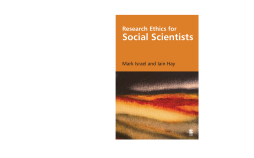
BOOK
Research Ethics for Social Scientists: Between ethical conduct and regulatory compliance
(2006)
Additional Information
Book Details
Abstract
'This is an excellent book which can be recommended both to the professional ethicist seeking to situate research ethics for a social scientific audience and to social scientists seeking an overview of the current ethical landscape of their discipline' - Research Ethics Review. Ethics is becoming an increasingly prominent issue for all researchers across the western world. This comprehensive and accessible guide introduces students to the field and encourages knowledge of research ethics in practice.
Table of Contents
| Section Title | Page | Action | Price |
|---|---|---|---|
| Prelims (Preface, Contents, List of Figures, Tables and Maps, List of Boxes, List of Acronyms) | |||
| 1. Introduction, How This Book is Structured | |||
| PART 1: SETTING THE SCENE: COMMUNITY MANAGEMENT, THE PROJECT, COUNTRIES AND COMMUNITIES | |||
| 2. Setting the scene; A brief history of community management of rural water supply | |||
| 3. Participatory Action Research on community management of rural water supply | |||
| 4. Countries and communities | |||
| PART 2: THE STORIES: COMMUNITY MANAGEMENT IN PRACTICE | |||
| 5. The Stories; Living communities - complex and dynamic | |||
| 6. Factors that affect community cohesion | |||
| 7. Water flows through the lives of communities | |||
| 8. Instruments and techniques of management | |||
| 9. Management capacities | |||
| 10. Cost recovery and managing finances | |||
| 11. Selecting and designing water systems and protecting the source | |||
| 12. The enabling environment | |||
| 13. Why do systems fail? | |||
| PART 3: THE WAY FORWARD | |||
| 14. The Way Forward; Mapping the key factors of community management | |||
| 15. Factors external to the community | |||
| 16. From system to service - scaling up | |||
| 17. Investing in support | |||
| Back Matter (Appendices 1-4, References, Index) |
